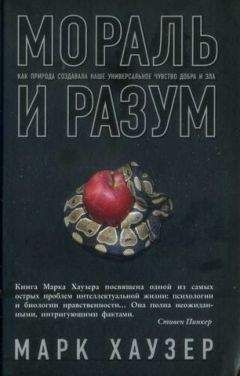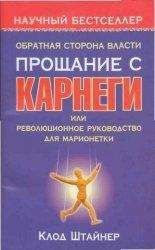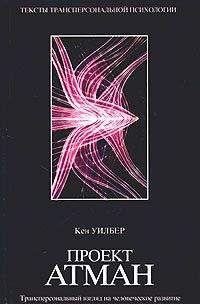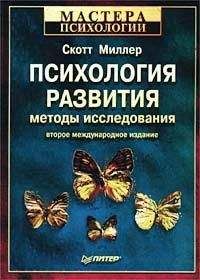Марк Хаузер - Мораль и разум. Как природа создавала наше универсальное чувство добра и зла

Скачивание начинается... Если скачивание не началось автоматически, пожалуйста нажмите на эту ссылку.
Жалоба
Напишите нам, и мы в срочном порядке примем меры.
Описание книги "Мораль и разум. Как природа создавала наше универсальное чувство добра и зла"
Описание и краткое содержание "Мораль и разум. Как природа создавала наше универсальное чувство добра и зла" читать бесплатно онлайн.
В книге известного американского ученого Марка Хаузера утверждается, что люди обладают врожденным моральным инстинктом, действующим независимо от их пола, образования и вероисповедания. Благодаря этому инстинкту, они могут быстро и неосознанно выносить суждения о добре и зле. Доказывая эту мысль, автор привлекает многочисленные материалы философии, лингвистики, психологии, экономики, социальной антропологии и приматологии, дает подробное объяснение природы человеческой морали, ее единства и источников вариативности, прослеживает пути ее развития и возможной эволюции. Книга имела большой научный и общественный резонанс в США и других странах. Перевод с английского Т. М. Марютиной Научный редактор перевода Ю. И. Александров
Hauser M. D. (1992). Costs of deception: cheaters are punished in rhesus monkeys // Proceedings of the National Academy of Sciences, 89, 12137—12139.
Hauser M. D. (1993). Rhesus monkey (Macaca mulatto} copulation calls: Honest signals for female choice? // Proceedings of the Royal Society, London, 254, 93— 96.
Hauser M. D. (1996). The Evolution of Communication. Cambridge, MA: MIT Press.
Hauser M. D. (1997). Minding the behavior of deception // A. Whiten & R. W Byrne (Eds.), Machiavellian Intelligence II (p. 112—143). Cambridge: Cambridge University Press.
Hauser М. D. (1998). Expectations about object motion and destination: Experiments with a nonhuman primate // Developmental Science, 1, 31—38.
Hauser M. D. (2000). Wild Minds: What Animals Really Think. New York: Henry Holt.
Hauser M. D. & Carey S. (1998). Building a cognitive creature from a set of primitives: Evolutionary and developmental insights // D. Cummins & C. Alien (Eds.), The Evolution of Mind (p. 51—106). Oxford: Oxford University Press.
Hauser M. D., Chen M. K., Chen E. & Chuang E. (2003). Give unto others: genetically unrelated cotton-top tamarin monkeys preferentially give food to those who altruistically give food back // Proceedings of the Royal Society, London, B, 270, 2363—2370.
Hauser M. D., Chomsky N. & Fitch W. T (2002). The faculty of language: What is it, who has it, and how did it evolve? // Science, 298, 1569—1579.
Hauser M. D. & Spelke E. (2004). Evolutionary and developmental foundations of human knowledge // M. Gazzaniga (Ed.), The Cognitive Neurosciences (p. 853—865). Cambridge, MA: MIT Press.
Hawkes K. (2003). Grandmothers and the evolution of human longevity // American Journal of Human Biology, 15, 380—400.
Hazlitt W. (1805/1969). An Essay on the Principles of Human Action and Some Remarks on the Systems of Hartley and Helvetius. Gainesville, FL: Scholars’ Facsimiles and Reprints.
Heider E & Simmel M. (1944). An experimental study of apparent behavior // American Journal of Psychology, 57, 243—259.
Heinsohn R. & Packer C. (1995). Complex cooperative strategies in group-territorial African lions // Science, 269, 1260—1262.
Henrich J., Boyd R., Bowles S., Camerer C, Fehr E., Gintis H. & McElreath R. (2001). In search of Homo economicus: behavioral experiments in fifteen smallscale societies // American Economics Review, 91, 73—78.
Henrich ]., Boyd R., Bowles S., Camerer G, Fehr E., G intis H., McElreath R., Barr A., EnsmingerJ., Hill K., Gil-White F, Gurven M., Marlowe E, Patton J. Q., Smith N. & Tracer D. (in press). Economic Man in cross-cultural perspective: behavioral experiments in 15 small scale societies // Behavioral and Brain Research, 28, 795—855.
Heyes С. M. (1998). Theory of mind in nonhuman primates // Behavioral and Brain Sciences, 21,101—114.
Higley J. D.,Mehlman P T, Higley S. B.,Femald B., Vickers J., Lindell S. G., Taub D. M., Suomi S. J. & Linnoila M. (1996). Excessive mortality in young free-ranging male nonhuman primates with low cerebrospinal fluid 5-hydroxy-indoleacetic acid concentrations // Archives of General Psychiatry, 53, 537—543.
Hill K. (2002). Altruistic cooperation during foraging by the Ache, and the evolved human predisposition to cooperate // Human Nature, 13, 105—128.
Hinde R. A. (2003). Why Good Is Good: The sources of morality. London: Routledge.
Hirschfeld L. A. (1996). Race in the Making: Cognition, culture and the child’s construction of human Kinds. Cambridge, MA: MIT Press.
Hirschi T & Gottfredson M. R. (1983). Age and the explanation of crime // American Journal of Sociology, 89, 552—584.
Hobbes T (1651/1968). Leviathan. New York: Penguin.
Hobbes Т (Ed.). (1642/1962). De Corpore. New York: Oxford University Press.
Hobson R. R (2002). The Cradle of Thought. London: Macmillan.
Hoffman M. L. (2000). Empathy and Moral Development. Cambridge: Cambridge University Press.
Hollander E. & Stein D. (1995). Impulsivity and Aggression. New York: Wiley Press.
Horder J. (1992). Provocation and Responsibility. Oxford: Clarendon Press.
Hrdy S. B. (1999). Mother Nature: A history of mothers, infants, and natural selection. New York: Pantheon Books.
Hume D. (1739/1978). A Treatise of Human Nature. Oxford: Oxford University Press.
Hume D. (Ed.). (1748). Enquiry Concerning the Principles of Morals. Oxford: Oxford University Press.
Huntsman R. W. (1984). Children’s concepts of fair sharing //Journal of Moral Education, 13, 31—39.
Hurley S. (2003). Animal action in the space or reasons // Mind and Language, 18, 231—256.
Hursthouse R. (1999). On Virtue Ethics. New York: Oxford University Press.
Hutcheson F (1728/1971). Illustrations on the Moral Sense. Cambridge, MA: Harvard University Press.
Huxley T H. (1888). The struggle for existence: a programme // Nineteenth Century, 2 J, 161—180.
Inagaki K. & Hatano G. (2002). Young Children’s Thinking about the Biological World. New York: Psychology Press.
Inagaki K. & Hatano G. (2004). Vitalistic causality in young children’s naive biology // Trends in Cognitive Science, #[#], 356—362.
Intrator J., Hare R. D., Stritzke R, Brichtswein K., Dorfman D., Harpur T, Bernstein D., Handelsman L., Schaefer C., Keilp ]., Rosen J. & Machac J. (1997). A brain imaging (single photon emission computerized tomography) study of semantic and affective processing in psychopaths // Biological Psychiatry, 42, 96—103.
Ivins M. (2004). Imperialists’ ball. The Progressive, June, 50.
JackendojfR. (2002). Foundations of Language. New York: Oxford University Press.
Jefferson T. (1787/1955). Letter to Peter Carr, August 10 //J. P Boyd (Ed.), The Papers of Thomas Jefferson (p. 15).
Johnson S. C. (2000). The recognition of mentalistic agents in infancy // Trends in Cognitive Science, 4, 22—28.
Johnson S. C. (2003). Detecting agents // Philosophical Transactions of the Royal Society of London, B, 358, 549—559.
Johnson S. C. & Carey S. (1998). Knowledge enrichment and conceptual change in folk biology: evidence from people with Williams syndrome // Cognitive Psychology, 37, 156—200.
Johnstone R. A. & Dugatkin L. A. (2000). Coalition formation in animals and the nature of winner and loser effects // Proceedings of the Royal Society, London, B, 267, 17—21.
KacelnikA. (1997). Normative and descriptive models of decision making, time discounting and risk sensitivity // G. Bock & G. Cardew (Eds.), Characterizing Human Psychological Adaptations (p. 51—70). London: Wiley.
Kacelnik A. (2003). The evolution of patience // G. Loewenstein (Ed.), Time and Decision: Economics and Psychological Perspectives on Intertemporal Choice (p. 115—138). New York: Russell Sage Foundation.
Kagan J. (1998). Three Seductive Ideas. Cambridge, MA: Harvard University Press.
Kagan J. (2000). Human morality is distinctive //Journal of Consciousness Studies, 7, 46—48.
Kagan J. (2002a). Morality, altruism, and love // S. G. Post & L.'G. Underwood & J. P Schloss & W B. Hurlbut. (Eds.), Altruism and Altruistic Love (p. 40—50). New York: Oxford University Press.
Kagan J. (2002b). Surprise, Uncertainty, and Mental Structures. Cambridge, MA: Harvard University Press.
Kagan /., Reznick J. S. & Snidman N. (1988). Biological bases of childhood shyness // Science, 250, 167—171.
Kagan /., Snidman N. & Arcus D. (1998). Childhood derivatives of high and low reactivity in infancy // Child Development, 69, 1483—1493.
Kagan S. (1988). The additive fallacy // Ethics, 90, 5—31.
Kagel J. H. & Roth A. E. (1995). Handbook of Experimental Economics. Princeton, NJ: Princeton University Press.
Kahn P. (2004). Mind and morality // New Directions for Child and Adolescent Development, 103, 73—83.
Kahneman Z)., Schkade D. & Sunstein C. R. (1998). Shared outrage and erratic awards: the psychology of punitive damages // Journal of Risk and Uncertainty, 16y 49—86.
Kalnins I. V. bi Bruner J. S. (1973). The coordination of visual observation and instrumental behavior in early infancy // Perception, 2, 307—314.
Kaminski /., Call J. & Tomasello M. (2004). Body orientation and face orientation: two factors controlling apes’ begging behavior from humans // Animal Cognition, 7, 216—223.
Kamm E M. (1992). Creation and Abortion: A study in moral and legal philosophy. New York: Oxford University Press.
Kamm F. M. (1998). Morality, Mortality: Death and whom to save from it. New York: Oxford University Press.
Kamm F. M. (2000). Nonconsequentialism // H. LaFollette (Ed.), Ethical Theory (p. 205—226). Maiden, MA: Blackwell Publishing.
Kamm F. M. (2001a). Morality, Mortality: Rights, duties, and status. New York: Oxford University Press.
Kamm F. M. (2001b). Ronald Dworkin on abortion and assisted suicide // The Journal of Ethics, 5, 221—240.
Kamm F. M. (2004). Failures of just war theory: terror, harm, and justice // Ethics, 114,650—692.
Kane R. (1998). Through the Moral Maze: Searching for Absolute Values in a Pluralistic World. New York: Paragon House.
Kant I. (1785/1959). Foundations of the Metaphysics of Morals (L. W Beck, Trans.). New York: Macmillan.
Kant I. (2001). Lectures on Ethics. New York: Cambridge University Press.
Kanwisher N. (2000). Domain specificity in face perception // Nature Neuroscience, 3, 759—763.
Kanwisher N.y Downing R, Epstein R. & Kourtzi 2. (2001). Functional neuroimaging of human visual recognition // Kingstone & Cabeza (Eds.), The Handbook on Functional Neuroimaging (p. 109—152). Cambridge, MA: MIT Press.
Kaplan J. R., Fontenot M. В., Berard J. & Manuck S. B. (1995). Delayed dispersal and elevated monoaminergic activity in free-ranging rhesus monkeys // American Journal of Primatology, 35, 229—234.
Kaplow L. & Shavell S. (2002). Fairness versus Welfare. Cambridge, MA: Harvard University Press.
Karmiloff-Smith A. (1992). Beyond Modularity. Cambridge, MA: MIT Press.
Keil L. J. (1986). Rules, reciprocity, and rewards: a developmental study of resource allocation in social interaction // Journal of Experimental Social Psychology, 22, 419—435.
Kelly M. H. (1999). Regional naming patterns and the culture of honor // Names, 47, 3—20.
Ketelaar T biAuW-T (2003). The effects of feelings of guilt on the behaviour of uncooperative individuals in repeated social bargaining games: an affect-as-information interpretation of the role of emotion in social interaction // Cognition and Emotion, 77, 429—453.
Kiehl K. A. y Hare R. D.yLiddle P. E & McDonald J. J. (1999). Reduced P300 responses in criminal psychopaths during a visual oddball task // Biological Psychiatry, 45 у 1498—1507.
Kiehl К. A. у Smith A. M., Hare R. D.yMendrekA.y Forster B. B.y Brink J. & Liddle P F. (2001). Limbic abnormalities in affective processing by criminal psychopaths as revealed by functional magnetic resonance imaging // Biological Psychiatry, 50, 677—684.
Kitcher P (1985). Vaulting Ambition: Sociobiology and the quest for human nature. Cambridge, MA: MIT Press.
Knobe J. (2003a). Intentional action and side effects in ordinary language // Analysis, 63, 190—193.
Knobe J. (2003b). Intentional action in folk psychology: an experimental investigation // Philosophical Psychology, 16, 309—324.
Kochanska G., Murray K., Jacques T Y., Koenig A. L. & Vandegeest K. A. (1996). Inhibitory control in young children and its role in emerging internalization // Child Development, 67, 490—507.
Kohlberg L. (1981). Essays on Moral Development, Volume 1: The Philosophy of Moral Development. New York: Harper and Row.
Korsgaard С. M. (1996). Sources of Normativity. Cambridge: Cambridge University Press.
Krebs J. R. & Dawkins R. (1984). Animal signals: mind-reading and manipulation // J. R. Krebs & N. B. Davies (Eds.), Behavioural Ecology (p. 380—402). Sunderland, MA: Sinauer Associates Inc.
Kruska D. (1988). Mammalian domestication and its effect on brain structure and behavior // H. J. Jerison (Ed.), Intelligence and Evolutionary Biobgy (p. 211— 250). New York: Springer Verlag.
Подписывайтесь на наши страницы в социальных сетях.
Будьте в курсе последних книжных новинок, комментируйте, обсуждайте. Мы ждём Вас!
Похожие книги на "Мораль и разум. Как природа создавала наше универсальное чувство добра и зла"
Книги похожие на "Мораль и разум. Как природа создавала наше универсальное чувство добра и зла" читать онлайн или скачать бесплатно полные версии.
Мы рекомендуем Вам зарегистрироваться либо войти на сайт под своим именем.
Отзывы о "Марк Хаузер - Мораль и разум. Как природа создавала наше универсальное чувство добра и зла"
Отзывы читателей о книге "Мораль и разум. Как природа создавала наше универсальное чувство добра и зла", комментарии и мнения людей о произведении.

























